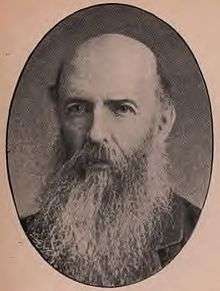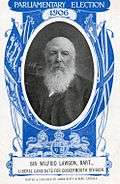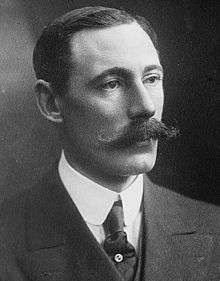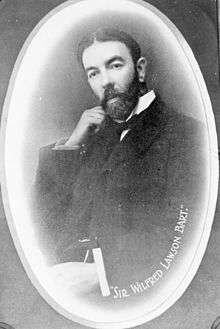Cockermouth (UK Parliament constituency)
Cockermouth was the name of a constituency of the House of Commons of the Parliament of England in 1295, and again from 1641, then of the Parliament of Great Britain from 1707 to 1800 and of the Parliament of the United Kingdom from 1801 to 1918. It was a parliamentary borough represented by two Members of Parliament until 1868, and by one member from 1868 to 1885. The name was then transferred to a county constituency electing one MP from 1885 until 1918.
| Cockermouth division of Cumberland | |
|---|---|
| Former County constituency for the House of Commons | |
| 1885–1918 | |
| Replaced by | Workington and Penrith and Cockermouth |
| Created from | West Cumberland and Cockermouth |
| 1641–1885 | |
| Replaced by | Cockermouth |
| Created from | Cumberland |
| 1295–1295 | |
| Replaced by | Cumberland |
| Created from | Cumberland |
Notable MPs have included the regicide, Francis Allen.
The borough constituency (until 1885)
Until the Great Reform Act of 1832, the constituency consisted solely of the market town of Cockermouth in Cumberland. It first returned members to the Model Parliament of 1295, but its franchise then seems to have lapsed until 1641, when the Long Parliament passed a resolution (15 February 1641) to restore its ancient privileges.
The right of election in Cockermouth was vested in the burgage tenants of the borough, of whom there were about 300 in 1832. Cockermouth was considered a pocket borough, with the vast majority of the voters being under the influence of the Lowther family.
At the time of the 1831 census, the borough included just over 1,000 houses and had a population of 4,536. The Reform Act expanded the boundaries to bring in the neighbouring parishes of Eaglesfield, Brigham, Papcastle and Bridekirk, and part of Dovenby, increasing the population to 6,022 and encompassing 1,325 houses. This made the borough big enough to retain both its members. However, in the next wave of reform, introduced at the 1868 general election, one of Cockermouth's two seats was withdrawn, and in 1885 the borough was abolished altogether, although the name was transferred to the surrounding county constituency.
The county constituency (1885-1918)
The Cockermouth constituency created in 1885, strictly speaking The Cockermouth Division of Cumberland, was a compact division stretching westwards from Cockermouth to the sea, and including the much larger town of Workington. There was a significant Irish vote, and the Conservative victory in 1885 and subsequent Liberal gain of the seat in 1886 have been attributed to Parnell's shift of support from the one party to the other.
The constituency was divided between the new Workington and Penrith and Cockermouth divisions of Cumberland from 1918.
Members of Parliament
Cockermouth re-enfranchised by Parliament in Nov 1640
MPs 1641–1868
MPs 1868–1885
| Election | Member | Party | |
|---|---|---|---|
| 1868 | Isaac Fletcher | Liberal | |
| 1879 by-election | William Fletcher | Liberal | |
| 1880 | Edward Waugh | Liberal | |
| 1885 | Borough abolished; name transferred to county division | ||
MPs 1885–1918
Cockermouth Division of Cumberland
| Election | Member | Party | |
|---|---|---|---|
| 1885 | Charles James Valentine | Conservative | |
| 1886 | Sir Wilfrid Lawson | Liberal | |
| 1900 | John Randles | Conservative | |
| 1906 | Sir Wilfrid Lawson | Liberal | |
| 1906 | Sir John Randles | Conservative | |
| 1910 | Sir Wilfrid Lawson jnr. | Liberal | |
| 1916 | Joseph Bliss | Liberal | |
| 1918 | constituency abolished | ||
Elections
Elections in the 1830s
| Party | Candidate | Votes | % | ± | |
|---|---|---|---|---|---|
| Tory | Randolph Stewart | Unopposed | |||
| Whig | Philip Pleydell-Bouverie | Unopposed | |||
| Registered electors | c. 235 | ||||
| Tory hold | |||||
| Whig gain from Tory | |||||
| Party | Candidate | Votes | % | ± | |
|---|---|---|---|---|---|
| Tory | John Lowther | Unopposed | |||
| Tory | James Scarlett | Unopposed | |||
| Registered electors | c. 235 | ||||
| Tory hold | |||||
| Tory gain from Whig | |||||
| Party | Candidate | Votes | % | ± | |
|---|---|---|---|---|---|
| Whig | Fretchville Lawson Ballantine Dykes | 187 | 40.2 | N/A | |
| Radical | Henry Aglionby Aglionby | 153 | 32.9 | N/A | |
| Radical | Andrew Green[22][20] | 125 | 26.9 | N/A | |
| Majority | 34 | 7.3 | N/A | ||
| Turnout | 255 | 83.6 | N/A | ||
| Registered electors | 305 | ||||
| Whig gain from Tory | Swing | N/A | |||
| Radical gain from Tory | Swing | N/A | |||
| Party | Candidate | Votes | % | ± | |
|---|---|---|---|---|---|
| Radical | Henry Aglionby Aglionby | 192 | 42.7 | −17.1 | |
| Whig | Fretchville Lawson Ballantine Dykes | 145 | 32.2 | +12.1 | |
| Whig | Edward Horsman | 113 | 25.1 | +5.0 | |
| Majority | 47 | 10.4 | N/A | ||
| Turnout | 258 | 78.7 | −4.9 | ||
| Registered electors | 328 | ||||
| Radical hold | Swing | −17.1 | |||
| Whig hold | Swing | +10.3 | |||
Dykes resigned, causing a by-election.
| Party | Candidate | Votes | % | ± | |
|---|---|---|---|---|---|
| Whig | Edward Horsman | Unopposed | |||
| Whig hold | |||||
| Party | Candidate | Votes | % | ± | |
|---|---|---|---|---|---|
| Radical | Henry Aglionby Aglionby | 169 | 42.0 | −0.7 | |
| Whig | Edward Horsman | 122 | 30.3 | +5.2 | |
| Whig | Richard Benson | 111 | 27.6 | −4.6 | |
| Majority | 47 | 11.7 | +1.3 | ||
| Turnout | 229 | 77.1 | −1.6 | ||
| Registered electors | 297 | ||||
| Radical hold | Swing | −0.7 | |||
| Whig hold | Swing | +2.8 | |||
Elections in the 1840s
Horsman was appointed a Lord Commissioner of the Treasury, requiring a by-election.
| Party | Candidate | Votes | % | ± | |
|---|---|---|---|---|---|
| Whig | Edward Horsman | 117 | 56.3 | −1.6 | |
| Conservative | Henry Wyndham | 91 | 43.8 | N/A | |
| Majority | 26 | 12.5 | N/A | ||
| Turnout | 208 | 72.2 | −4.9 | ||
| Registered electors | 288 | ||||
| Whig hold | Swing | N/A | |||
| Party | Candidate | Votes | % | ± | |
|---|---|---|---|---|---|
| Radical | Henry Aglionby Aglionby | 129 | 36.2 | +5.8 | |
| Whig | Edward Horsman | 127 | 35.7 | −22.2 | |
| Conservative | Henry Wyndham | 100 | 28.1 | N/A | |
| Turnout | 228 | 78.2 | +1.1 | ||
| Registered electors | 293 | ||||
| Majority | 2 | 0.6 | −11.1 | ||
| Radical hold | Swing | '+8.5 | |||
| Majority | 27 | 7.6 | N/A | ||
| Whig hold | Swing | −8.5 | |||
| Party | Candidate | Votes | % | ± | |
|---|---|---|---|---|---|
| Whig | Edward Horsman | Unopposed | |||
| Radical | Henry Aglionby Aglionby | Unopposed | |||
| Registered electors | 319 | ||||
| Whig hold | |||||
| Radical hold | |||||
Elections in the 1850s
| Party | Candidate | Votes | % | ± | |
|---|---|---|---|---|---|
| Conservative | Henry Wyndham | 160 | 34.7 | N/A | |
| Radical | Henry Aglionby Aglionby | 154 | 33.4 | N/A | |
| Whig | Edward Horsman | 147 | 31.9 | N/A | |
| Turnout | 311 (est) | 87.5 (est) | N/A | ||
| Registered electors | 355 | ||||
| Majority | 6 | 1.3 | N/A | ||
| Conservative gain from Whig | |||||
| Majority | 7 | 1.5 | N/A | ||
| Radical hold | |||||
Aglionby's death caused a by-election.
| Party | Candidate | Votes | % | ± | |
|---|---|---|---|---|---|
| Radical | John Steel | Unopposed | |||
| Radical hold | |||||
| Party | Candidate | Votes | % | ± | |
|---|---|---|---|---|---|
| Conservative | Richard Bourke | Unopposed | |||
| Radical | John Steel | Unopposed | |||
| Registered electors | 408 | ||||
| Conservative hold | |||||
| Radical hold | |||||
Bourke was appointed Chief Secretary to the Lord Lieutenant of Ireland, requiring a by-election.
| Party | Candidate | Votes | % | ± | |
|---|---|---|---|---|---|
| Conservative | Richard Bourke | Unopposed | |||
| Conservative hold | |||||
| Party | Candidate | Votes | % | ± | |
|---|---|---|---|---|---|
| Conservative | Richard Bourke | Unopposed | |||
| Liberal | John Steel | Unopposed | |||
| Registered electors | 412 | ||||
| Conservative hold | |||||
| Liberal hold | |||||
Elections in the 1860s
| Party | Candidate | Votes | % | ± | |
|---|---|---|---|---|---|
| Conservative | Richard Bourke | Unopposed | |||
| Liberal | John Steel | Unopposed | |||
| Registered electors | 336 | ||||
| Conservative hold | |||||
| Liberal hold | |||||
Bourke was appointed Chief Secretary to the Lord Lieutenant of Ireland, requiring a by-election.
| Party | Candidate | Votes | % | ± | |
|---|---|---|---|---|---|
| Conservative | Richard Bourke | Unopposed | |||
| Conservative hold | |||||
Steel's death caused a by-election.
| Party | Candidate | Votes | % | ± | |
|---|---|---|---|---|---|
| Conservative | Andrew Green Thompson | 171 | 54.3 | N/A | |
| Liberal | Isaac Fletcher | 144 | 45.7 | N/A | |
| Majority | 27 | 8.6 | N/A | ||
| Turnout | 315 | 93.8 | N/A | ||
| Registered electors | 336 | ||||
| Conservative gain from Liberal | |||||
Seat reduced to one member
| Party | Candidate | Votes | % | ± | |
|---|---|---|---|---|---|
| Liberal | Isaac Fletcher | 620 | 61.5 | N/A | |
| Conservative | Henry Lorton Bourke[23] | 388 | 38.5 | N/A | |
| Majority | 232 | 23.0 | N/A | ||
| Turnout | 1,008 | 93.9 | N/A | ||
| Registered electors | 1,074 | ||||
| Liberal hold | |||||
Elections in the 1870s
| Party | Candidate | Votes | % | ± | |
|---|---|---|---|---|---|
| Liberal | Isaac Fletcher | 506 | 56.6 | −4.9 | |
| Conservative | John Henry Fawcett[24] | 388 | 43.4 | +4.9 | |
| Majority | 118 | 13.2 | −9.8 | ||
| Turnout | 894 | 83.0 | −10.9 | ||
| Registered electors | 1,077 | ||||
| Liberal hold | Swing | −4.9 | |||
Fletcher's suicide caused a by-election.
| Party | Candidate | Votes | % | ± | |
|---|---|---|---|---|---|
| Liberal | William Fletcher | 557 | 60.3 | +3.7 | |
| Conservative | David Rapley[26] | 366 | 39.7 | −3.7 | |
| Majority | 191 | 20.7 | +7.5 | ||
| Turnout | 923 | 83.8 | +0.8 | ||
| Registered electors | 1,102 | ||||
| Liberal hold | Swing | +3.7 | |||
Elections in the 1880s
| Party | Candidate | Votes | % | ± | |
|---|---|---|---|---|---|
| Liberal | Edward Waugh | 582 | 60.5 | +3.9 | |
| Conservative | Robert Webster[27] | 380 | 39.5 | −3.9 | |
| Majority | 202 | 21.0 | +7.8 | ||
| Turnout | 962 | 87.9 | +4.9 | ||
| Registered electors | 1,094 | ||||
| Liberal hold | Swing | +3.9 | |||
| Party | Candidate | Votes | % | ± | |
|---|---|---|---|---|---|
| Conservative | Charles James Valentine | 3,845 | 50.1 | +10.6 | |
| Liberal | Wilfrid Lawson | 3,835 | 49.9 | −10.6 | |
| Majority | 10 | 0.2 | N/A | ||
| Turnout | 7,680 | 80.5 | −7.4 | ||
| Registered electors | 9,538 | ||||
| Conservative gain from Liberal | Swing | +10.6 | |||

| Party | Candidate | Votes | % | ± | |
|---|---|---|---|---|---|
| Liberal | Wilfrid Lawson | 4,130 | 56.9 | +7.0 | |
| Liberal Unionist | Henry Frazer Curwen[30] | 3,126 | 43.1 | −7.0 | |
| Majority | 1,004 | 13.8 | N/A | ||
| Turnout | 7,256 | 76.1 | −4.4 | ||
| Registered electors | 9,538 | ||||
| Liberal gain from Conservative | Swing | +7.0 | |||
Elections in the 1890s
| Party | Candidate | Votes | % | ± | |
|---|---|---|---|---|---|
| Liberal | Wilfrid Lawson | 4,599 | 54.6 | −2.3 | |
| Conservative | John Scott Napier | 3,829 | 45.4 | +2.3 | |
| Majority | 770 | 9.2 | −4.6 | ||
| Turnout | 8,428 | 77.3 | +1.2 | ||
| Registered electors | 10,906 | ||||
| Liberal hold | Swing | −2.3 | |||
| Party | Candidate | Votes | % | ± | |
|---|---|---|---|---|---|
| Liberal | Wilfrid Lawson | 4,259 | 51.5 | −3.1 | |
| Conservative | Thomas Milvain | 4,018 | 48.5 | +3.1 | |
| Majority | 241 | 3.0 | −6.2 | ||
| Turnout | 8,277 | 80.8 | +3.5 | ||
| Registered electors | 10,242 | ||||
| Liberal hold | Swing | −3.1 | |||
Elections in the 1900s
| Party | Candidate | Votes | % | ± | |
|---|---|---|---|---|---|
| Conservative | John Randles | 4,276 | 51.3 | +2.8 | |
| Liberal | Wilfrid Lawson | 4,067 | 48.7 | −2.8 | |
| Majority | 209 | 2.8 | N/A | ||
| Turnout | 8,343 | 76.6 | −4.2 | ||
| Registered electors | 10,897 | ||||
| Conservative gain from Liberal | Swing | +2.8 | |||

| Party | Candidate | Votes | % | ± | |
|---|---|---|---|---|---|
| Liberal | Wilfrid Lawson | 5,349 | 52.8 | +4.1 | |
| Conservative | John Randles | 4,786 | 47.2 | −4.1 | |
| Majority | 563 | 5.6 | 8.2 | ||
| Turnout | 10,135 | 86.6 | +10.0 | ||
| Registered electors | 11,700 | ||||
| Liberal gain from Conservative | Swing | +4.1 | |||

| Party | Candidate | Votes | % | ± | |
|---|---|---|---|---|---|
| Conservative | John Randles | 4,593 | 46.2 | −1.0 | |
| Liberal | Frederick Guest | 3,903 | 39.3 | −13.5 | |
| Labour | Robert Smillie | 1,436 | 14.5 | N/A | |
| Majority | 690 | 6.9 | 12.5 | ||
| Turnout | 9,932 | 84.9 | −1.7 | ||
| Registered electors | 11,700 | ||||
| Conservative gain from Liberal | Swing | +6.2 | |||
Elections in the 1910s
| Party | Candidate | Votes | % | ± | |
|---|---|---|---|---|---|
| Conservative | John Randles | 4,579 | 45.2 | −1.0 | |
| Liberal | Wilfrid Lawson | 3,638 | 35.9 | −3.4 | |
| Labour | James Percy Whitehead | 1,909 | 18.9 | +4.4 | |
| Majority | 941 | 9.3 | +2.4 | ||
| Turnout | 89.4 | +4.5 | |||
| Conservative hold | Swing | +1.2 | |||

| Party | Candidate | Votes | % | ± | |
|---|---|---|---|---|---|
| Liberal | Wilfrid Lawson | 5,003 | 52.7 | +16.8 | |
| Conservative | John Randles | 4,492 | 47.3 | +2.1 | |
| Majority | 511 | 5.4 | 14.7 | ||
| Turnout | 83.8 | −5.6 | |||
| Liberal gain from Conservative | Swing | +7.4 | |||
General Election 1914/15:
Another General Election was required to take place before the end of 1915. The political parties had been making preparations for an election to take place and by the July 1914, the following candidates had been selected;
- Liberal: Wilfrid Lawson
- Unionist: Daniel Johnston Mason
- Labour:Thomas Cape
| Party | Candidate | Votes | % | ± | |
|---|---|---|---|---|---|
| Liberal | Joseph Bliss | unopposed | n/a | n/a | |
| Liberal hold | Swing | n/a | |||
References
- Fenwick was later elected for Northumberland, which he chose to represent, and ceased to sit for Cockermouth
- The election to replace Fenwick was disputed, and the Returning Officer made a double return, i.e. reported both candidates - Sir Thomas Sandford, Bt and Francis Allen - as elected, leaving Parliament to decide. The dispute was still unresolved when Sandford was declared disabled from sitting because of his Royalist sympathies in January 1644; Allen was admitted to sit in 1645.
- In a by-election in 1717, Seymour was defeated by Sir Wilfrid Lawson by 90 votes to 84, but Lawson was underage, and on petition Seymour was declared elected
- Wyndham was also elected for Taunton, which he chose to represent, and never sat for Cockermouth
- Created Earl of Thomond (in the peerage of Ireland), 1756
- Johnstone was re-elected at the general election of 1774, but was also elected for Appleby, which he chose to represent, and did not sit for Cockermouth in this parliament
- Norton was also elected for Carlisle, which he chose to represent, and never sat for Cockermouth
- Stooks Smith, Henry. (1973) [1844-1850]. Craig, F. W. S. (ed.). The Parliaments of England (2nd ed.). Chichester: Parliamentary Research Services. pp. 54–57. ISBN 978-0-900178-13-9.
- Churton, Edward (1836). The Assembled Commons or Parliamentary Biographer: 1836. pp. vii, 3.
- Kingsley, Nick (14 July 2013). "(55) Aglionby of Nunnery and Drawdykes Castle". Landed families of Britain and Ireland. Retrieved 3 May 2018.
- Ward, J. T. (1967). "The Making of a Whig". Sir James Graham. London: Palgrave Macmillan. p. 26. ISBN 978-1-349-00079-1. Retrieved 3 May 2018.
- "Cockermouth". Morning Post. 14 December 1832. p. 2. Retrieved 3 May 2018 – via British Newspaper Archive.
- Hawkins, Angus (2015). "Notions of Representation". Victorian Political Culture: 'Habits of Heart & Mind'. Oxford: Oxford University Press. p. 172. ISBN 978-0-19-872848-1.
- The Illustrated London News, Volume 6. Elm House. 1845. p. 184. Retrieved 3 May 2018.
- Mosse, Richard Bartholomew (1838). The Parliamentary Guide: a concise history of the Members of both Houses, etc. pp. 134, 186. Retrieved 3 May 2018.
- Cragg, David (2016). "Chapter 8 — Joseph Cragg (1803–1878) and Hannah Grave (1803–1878)". Cragg Family Origins: Great Britain 1770–1859. David Cragg. p. 98. ISBN 9780994519207. Retrieved 3 May 2018.
- Coohill, Joseph, ed. (17 October 2011). "Free Trade Agendas: The Construction of an Article of Faith, 1837–50". Texts & Studies 5: Ideas of the Liberal Party: Perceptions, Agendas and Liberal Politics in the House of Commons, 1832–52. 30 (s2): 170–203. doi:10.1111/j.1750-0206.2011.00262.x.
- "Cockermouth". Carlisle Patriot. 12 August 1854. pp. 4–5. Retrieved 3 May 2018 – via British Newspaper Archive.
- Dod, Charles Roger; Dod, Robert Phipps (1855). Dod's Parliamentary Companion. Dod's Parliamentary Companion. p. 279.
- Escott, Margaret. "Cockermouth". The History of Parliament. Retrieved 10 April 2020.
- Craig, F. W. S., ed. (1977). British Parliamentary Election Results 1832-1885 (e-book)
|format=requires|url=(help) (1st ed.). London: Macmillan Press. ISBN 978-1-349-02349-3. - "Cockermouth". Morning Post. 14 December 1832. p. 2. Retrieved 10 April 2020 – via British Newspaper Archive.
- "Cockermouth". Carlisle Patriot. 18 September 1868. p. 8. Retrieved 4 February 2018 – via British Newspaper Archive.
- "The General Election". The Morning Post. 5 February 1874. p. 2. Retrieved 28 December 2017 – via British Newspaper Archive.
- "Cockermouth Election". South Wales Daily News. 17 April 1879. Retrieved 6 October 2016 – via British Newspaper Archive.
- "Cockermouth Election". Rhyl Record and Advertiser. 19 April 1879. p. 3. Retrieved 28 December 2017 – via British Newspaper Archive.
- "The General Election". Lloyd's Weekly Newspaper. 4 April 1880. p. 7. Retrieved 25 November 2017.
- British Parliamentary Election Results 1885-1918, FWS Craig
- The Liberal Year Book, 1907
- "Yesterday's Nominations". London Evening Standard. 8 July 1886. p. 3. Retrieved 25 November 2017.
- Debrett's House of Commons & Judicial Bench, 1901
- Debrett's House of Commons & Judicial Bench, 1916
- Debrett's House of Commons & Judicial Bench, 1918
- D Brunton & D H Pennington, "Members of the Long Parliament" (London: George Allen & Unwin, 1954)
- Cobbett's Parliamentary history of England, from the Norman Conquest in 1066 to the year 1803 (London: Thomas Hansard, 1808)
- F W S Craig, "British Parliamentary Election Results 1832-1885" (2nd edition, Aldershot: Parliamentary Research Services, 1989)
- Michael Kinnear, "The British Voter" (London: Batsford, 1968)
- J Holladay Philbin, "Parliamentary Representation 1832 - England and Wales" (New Haven: Yale University Press, 1965)
- Henry Stooks Smith, "The Parliaments of England from 1715 to 1847" (2nd edition, edited by FWS Craig - Chichester: Parliamentary Reference Publications, 1973)
- Frederic A Youngs, jr, "Guide to the Local Administrative Units of England, Vol II" (London: Royal Historical Society, 1991)
- "The Constitutional Yearbook, 1913" (London: National Unionist Association, 1913)
- Leigh Rayment's Historical List of MPs – Constituencies beginning with "C" (part 5)